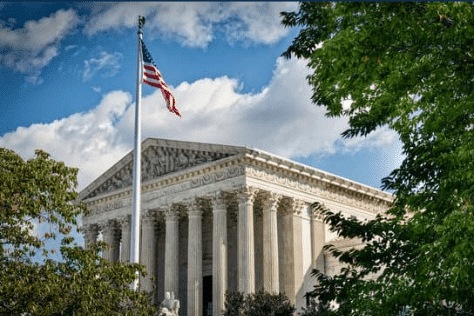Table Of Contents
SAN FRANCISCO (CN) — The U.S. Veterans Administration must honor the terms of a 1991 settlement and pay retroactive benefits to thousands of Navy veterans who served on ships off Vietnam’s coast for Agent Orange-related health problems, a federal judge ruled Thursday.
“It makes a huge difference to veterans and their families,” plaintiffs’ advocate Stephen Kinnaird of the firm Paul Hastings said in a phone interview.
The VA had argued that despite a recent court ruling entitling so-called Blue Water Navy vets to benefits, it never intended to include them in a deal it signed three decades ago. In that consent decree, the VA vowed to automatically reconsider past denials of benefits for conditions that it later found were tied to Agent Orange and to grant retroactive benefits.
Used ubiquitously by the U.S. military to clear forested areas in Vietnam, the toxic contaminant dioxin in Agent Orange has been linked to a slew of health problems, including leukemia, lymphoma, throat cancer and many other diseases.
A few months before the consent decree was signed in 1991, Congress passed the Agent Orange Act, which requires the VA to assume all veterans who “served in the Republic of Vietnam” from 1962 to 1975 were exposed to Agent Orange.
On Thursday, U.S. District Judge William Alsup rejected arguments that the settlement was never meant to include Blue Water Vietnam Navy vets who served on ships in Vietnam’s territorial waters but never set foot on the country’s soil or entered its inland waterways.
“The objective and reasonable intent of the consent decree was to require automatic readjudications for all persons entitled to benefits under the Acts,” Alsup wrote in a 10-page ruling.
From 1991 to 2002, the VA awarded retroactive benefits to Blue Water veterans under the terms of the consent decree. At that time, the VA used a Vietnam War service medal as the basis for assuming Agent Orange exposure.
In 2002, the VA changed its policy and instead started looking at whether each veteran had served on land or on inland waterways in Vietnam.
During a hearing last week, Alsup asked how the government could get around its prior decision to award benefits to Blue Water vets. A Justice Department advocate replied those benefits decisions were based on “internal guidance to VA adjudicators,” not a policy that was binding on the agency.
On Thursday, the judge deemed the inclusion of Blue Water vets in the settlement for 11 years as strong evidence of what was intended.
“This practical construction of the agreement torpedoes the agency’s later change of heart,” Alsup wrote.
This is the fourth time veterans filed a motion to enforce the consent decree. The court granted relief each time, and when the VA appealed two of those three decisions, the Ninth Circuit upheld the rulings each time.
“What is difficult for us to comprehend is why the Department of Veteran Affairs, having entered into a settlement agreement and agreed to a consent order some 16 years ago, continues to resist its implementation so vigorously, as well as to resist equally vigorously the payment of desperately needed benefits to Vietnam war veterans who fought for their country and suffered grievous injury as a result of our government’s own conduct,” the late U.S. Circuit Judge Stephen Reinhardt wrote for a three-judge panel in the Ninth Circuit’s most recent 2007 decision enforcing the settlement.
Prior to 2019, a series of court rulings found Blue Water vets were not entitled to a presumption of Agent Orange exposure under the Agent Orange Act. That changed last year when an en banc Federal Circuit panel ruled in Procopio v. Wilkie that excluding Blue Water veterans would violate the plain meaning of the 1991 statute, overriding its prior 2008 decision that deferred to the VA’s interpretation.
After the Procopio decision, Congress passed the Blue Water Navy Vietnam Veterans Act of 2019, which entitles Blue Water vets to retroactive benefits, but only if they file a new claim.
After that advocate was passed, the VA sent over 77,000 letters to Blue Water vets and their surviving family, received 63,800 claims, issued decisions on nearly 29,000 and granted 20,690, or 71%, of the decided claims. The VA has paid out $583.8 million in retroactive benefits to Blue Water vets as of August, according to the department.
Judge Alsup’s decision will ensure that Blue Water vets who had Agent Orange claims denied in the past will have those claims automatically reviewed without having to file a new claim. The settlement also covers surviving children and estates of deceased veterans, Congress last year.
Kinnaird said this will entitle thousands of veterans and their families to tens of millions of dollars, or potentially over $100 million, who would not otherwise have received those benefits.
“There are lot of people who for whatever reason aren’t aware of the Blue Water Navy [Vietnam Veterans] Act or because of various struggles aren’t filing new claims,” the advocate said. “The VA has to go back automatically and readjudicate.”
Alsup ordered the VA to submit a report in four months on how many claims it will reconsider and a follow-up report in eight months on how much it paid in benefits for those claims.
Justice Department advocate Michael Andrew Zee, who represents the VA, and the U.S. Department of Veterans Affairs did not immediately respond to emails seeking comment Thursday.
Iovino, Nicholas. “VA Must Pay Retroactive Benefits to Blue Water Vietnam Vets.” CNS, 6 Nov. 2020, www.courthousenews.com/va-must-pay-retroactive-benefits-to-blue-water-vietnam-vets/?fbclid=IwAR0bhdOzZ8dpAtqRkJNepF4nBijPPg_kLl1i_f4isqmTO5FaHRgeQpxbiz0.

Are Disabled Veterans Eligible for TRICARE?
Are Disabled Veterans Eligible for TRICARE? Simply being a disabled veteran doesn’t necessarily...

Why Veterans Help Group Is One of the Best VA Disability Firms for Veterans
Why Veterans Help Group Is One of the Best VA Disability Firms for Veterans When veterans begin...

More Care, More Perks, Fewer Staff: Inside the VA’s Ambitious 2026 Budget
More Care, More Perks, Fewer Staff: Inside the VA’s Ambitious 2026 Budget The U.S. House of...





